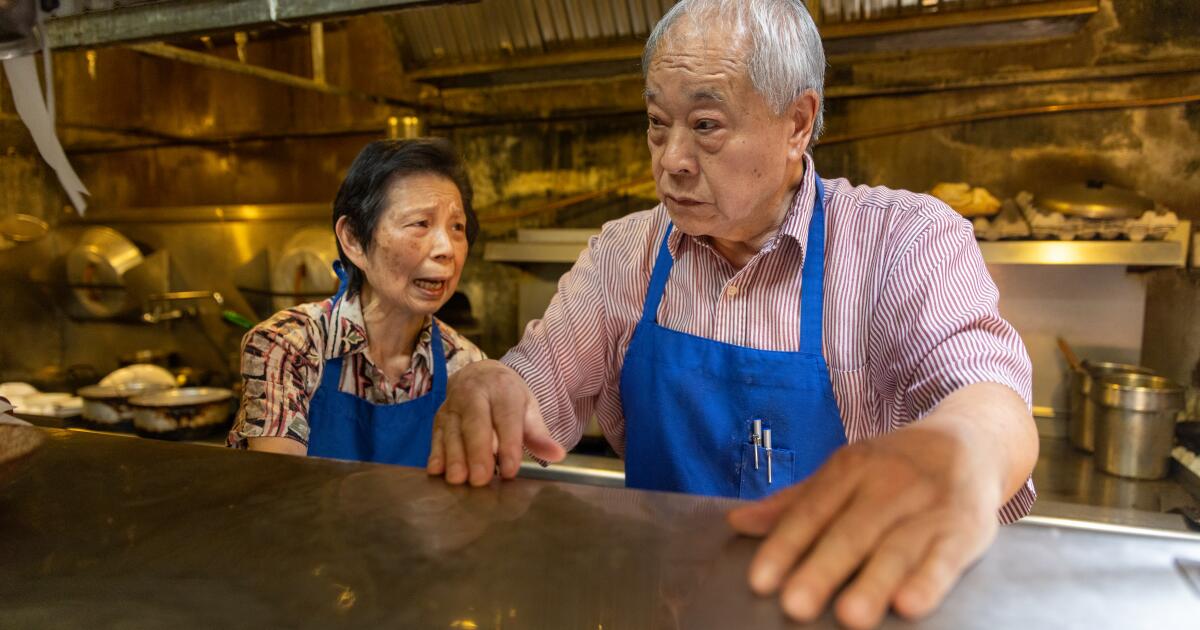The conundrum facing the Fong family of Woodland arose earlier this year, shortly after a UC Davis law professor grew interested in a sign posted above the counter that read: “The Chicago Cafe since 1903.”
The Fongs had never given that sign much thought, beyond taking pride in running a family business with a cherished history in the community.
Not Paul Fong, 76, who has worked at the restaurant with his wife, Nancy, 67, since emigrating from Hong Kong in 1973.
Amy Fong has spent plenty of time at the Chicago Cafe in Woodland, Calif. Growing up, she headed to her parents’ restaurant every day after school to do homework and help with chores.
(Carl Costas / For The Times)
And not his children, Amy Fong, 47, a physical therapist, and Andy Fong, 45, a software quality engineer at Apple. They grew up sweeping floors and doing homework in the restaurant after school, but had gone off to college (UC Berkeley for Amy; San Jose State for Andy) under strict orders from their parents to find good careers, far from the grind of restaurant work. Now, with children of their own, they were looking forward to their parents’ retirement; they wanted their parents to be able to relax and spend time with their grandchildren.
Then, one day in 2022, Gabriel “Jack” Chin, a law professor at UC Davis, stopped in for lunch. Chin is an expert in immigration law, specifically the Chinese Exclusion Act of 1882 that made it incredibly difficult for Chinese people to immigrate to the U.S. And he knew something the Fongs didn’t, something that would complicate the family’s efforts to wind the business down: If the sign behind the counter was accurate, if the Chicago Cafe truly had been operating since 1903, that would make it a treasure of historic significance.
In January, UC Davis announced the results of Chin’s research: Of the tens of thousands of Chinese restaurants serving food in America, the Fongs’ unsung little diner is the oldest one continuously operating in California, and probably in the U.S. The Fongs suddenly found themselves in possession of an important piece of American history, which had been sitting in plain sight in a farm town 20 miles northwest of Sacramento.
The media rushed to cover the story, and hordes of new customers followed. The Woodland City Council issued a proclamation, which included testimonials from council members about their favorite dishes. And instead of retiring, Paul and Nancy were working twice as hard.
On a recent Friday, their daughter, Amy, came by the restaurant with her two children and took in the scene, in its usual state of friendly chaos. Customers occupied almost every table and banquette, many chowing down the restaurant’s signature chop suey — which, like a lot of food served at the Chicago Cafe, is a Chinese American dish unfamiliar in China itself.
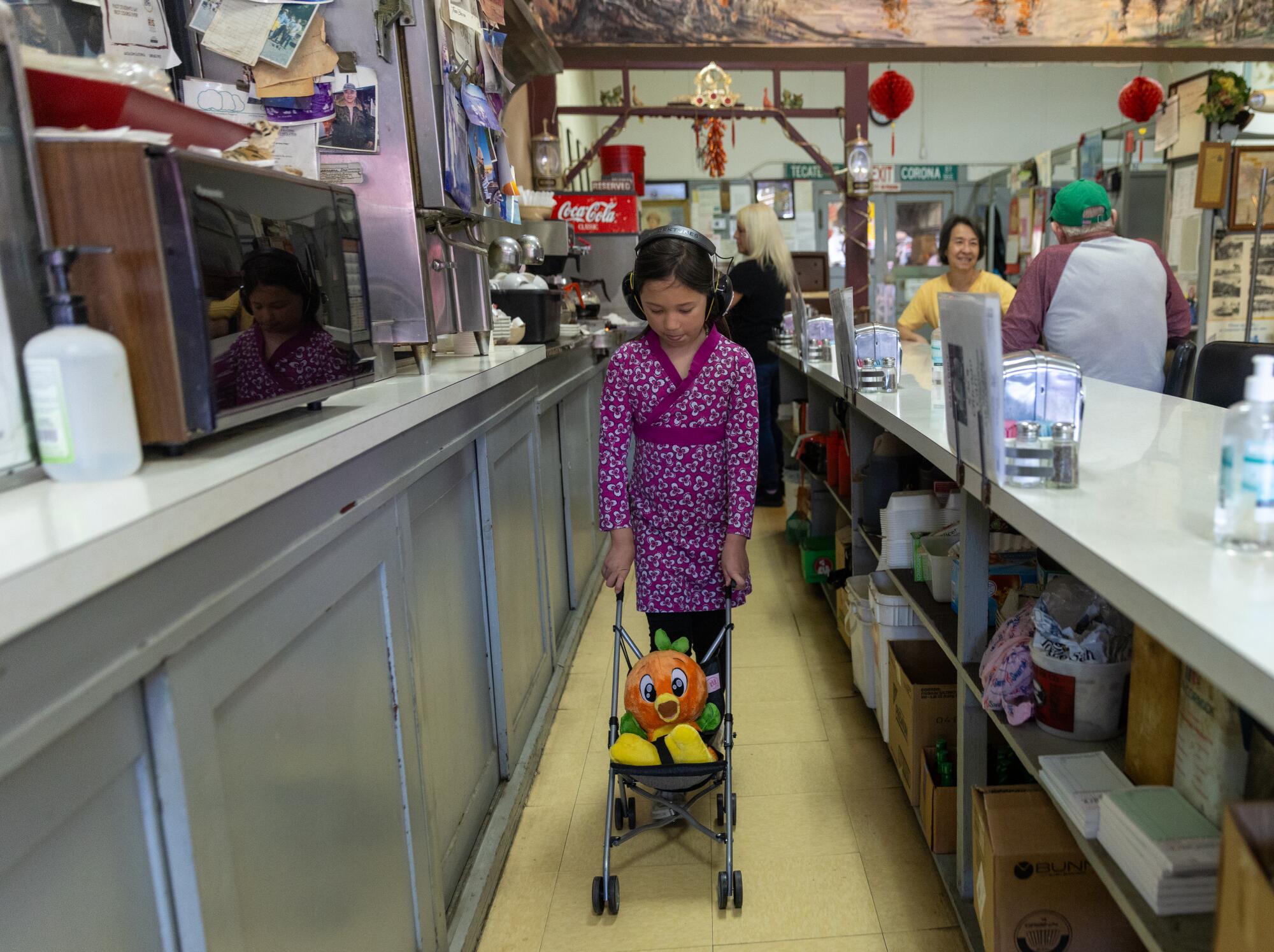
Amy Fong’s daughter, Kira Kranz, entertains herself during a visit to her grandparents’ restaurant.
(Carl Costas / For The Times)
The lone waitress, Dianna Oldstad, has worked with the Fongs for decades. She bustled to and fro, greeting regulars with gruff warmth. In the kitchen, Paul and Nancy raced from cutting board to grill with plates of meat and vegetables, and handed the finished dishes off with dizzying speed. Watching over it all were mounted deer and elk and a giant stuffed peacock with its tail unfurled in blue-green glory — gifts from customers over the years.
Paul’s pride in serving his diners, many of whom have become friends and fishing buddies, was evident. Still, his daughter noted with dismay: “They’re getting too old to do this every day.”
The family’s dilemma was so apparent that longtime customers chatted about it as they waited for their food: Would the Chicago Cafe simply end when Paul and Nancy retired? And how could its historic import have emerged just as the Fongs were finally ready to step back?
It is more complicated than one might guess to unearth the history of a Chinese restaurant that has been a fixture in a town for more than 100 years.
In part, that is because of the racism of the early 20th century: Local directories excluded Asian people and businesses until the 1930s, according to Chin. So records of the business had to be found elsewhere.
The Chinese Exclusion Act added another wrinkle. The law sought to prohibit immigration, but didn’t completely stop it. Instead, many Chinese people purchased the identity of Chinese Americans born in the U.S., and then posed as their relatives. The immigrants who came using fake identities were known as “paper sons.”
For a time, restaurants had their own exception to the Chinese Exclusion Act — which some coined “the lo mein loophole” — that allowed business owners to go to China on merchant visas to bring back employees. In the years after 1915, when a federal court added restaurants to the list of businesses allowed such visas, the number of Chinese restaurants in America exploded.
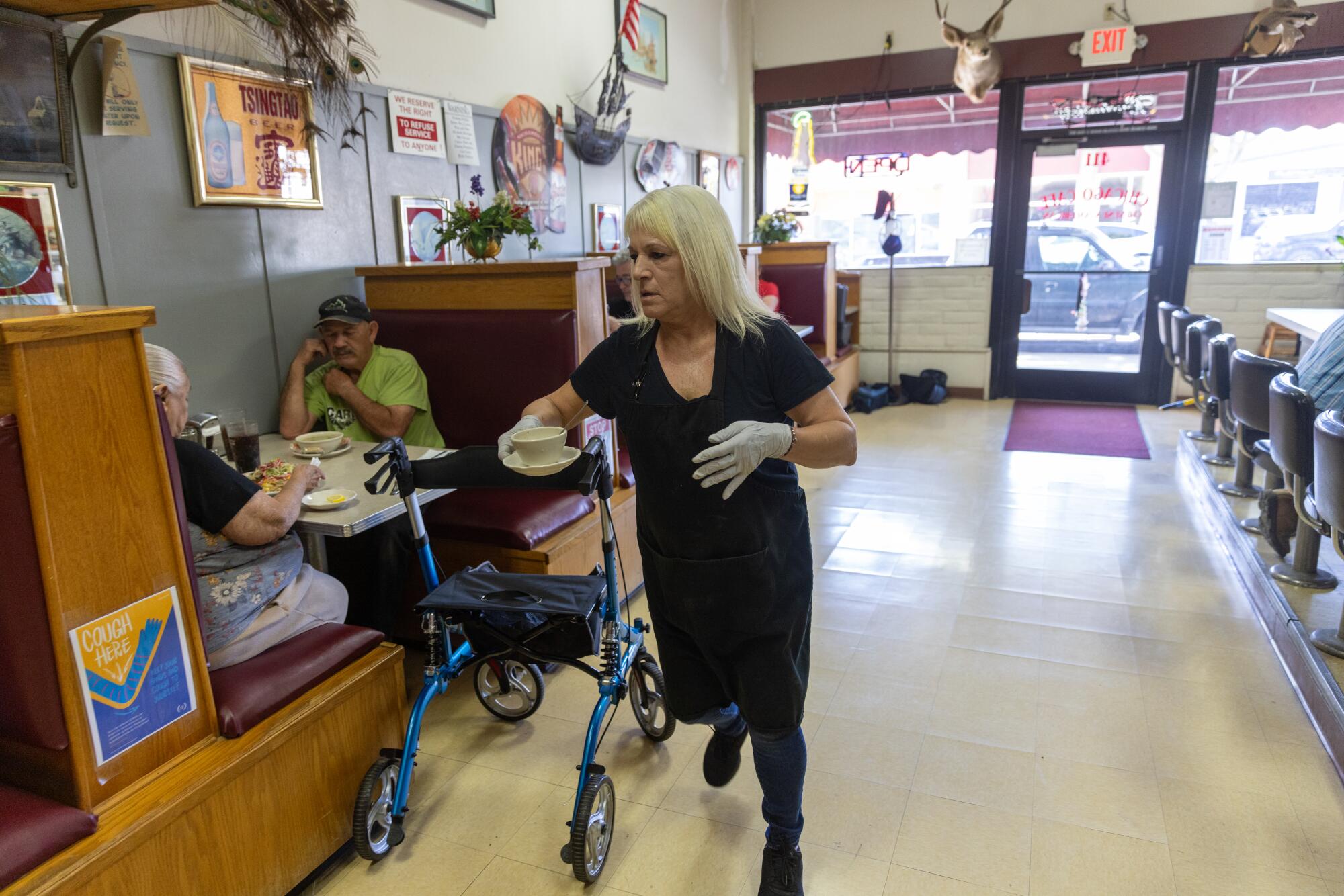
Dianna Olstad, the sole waitress at the Chicago Cafe, has worked with the Fongs for decades.
(Carl Costas / For The Times)
Paul Fong’s grandfather almost certainly came before the “lo mien loophole” went into effect. He came as a paper son, steaming into San Francisco Bay under the name Harry Young. The exact year is lost to history: The 1906 earthquake in San Francisco set off a fire that burned up reams of naturalization records — and also allowed many people to add extra “relatives” to the rolls when the records were reconstructed.
“Harry Young” made his way to Woodland, which had developed a busy Chinatown populated by immigrants who had come to work on the transcontinental railroad. At the time, many of Woodland’s neighborhoods were graced by stately Victorians, laid out on large lots shaded by towering oaks. Its Chinatown was a lot less grand: a collection of wood and brick structures built along Dead Cat Alley behind Main Street.
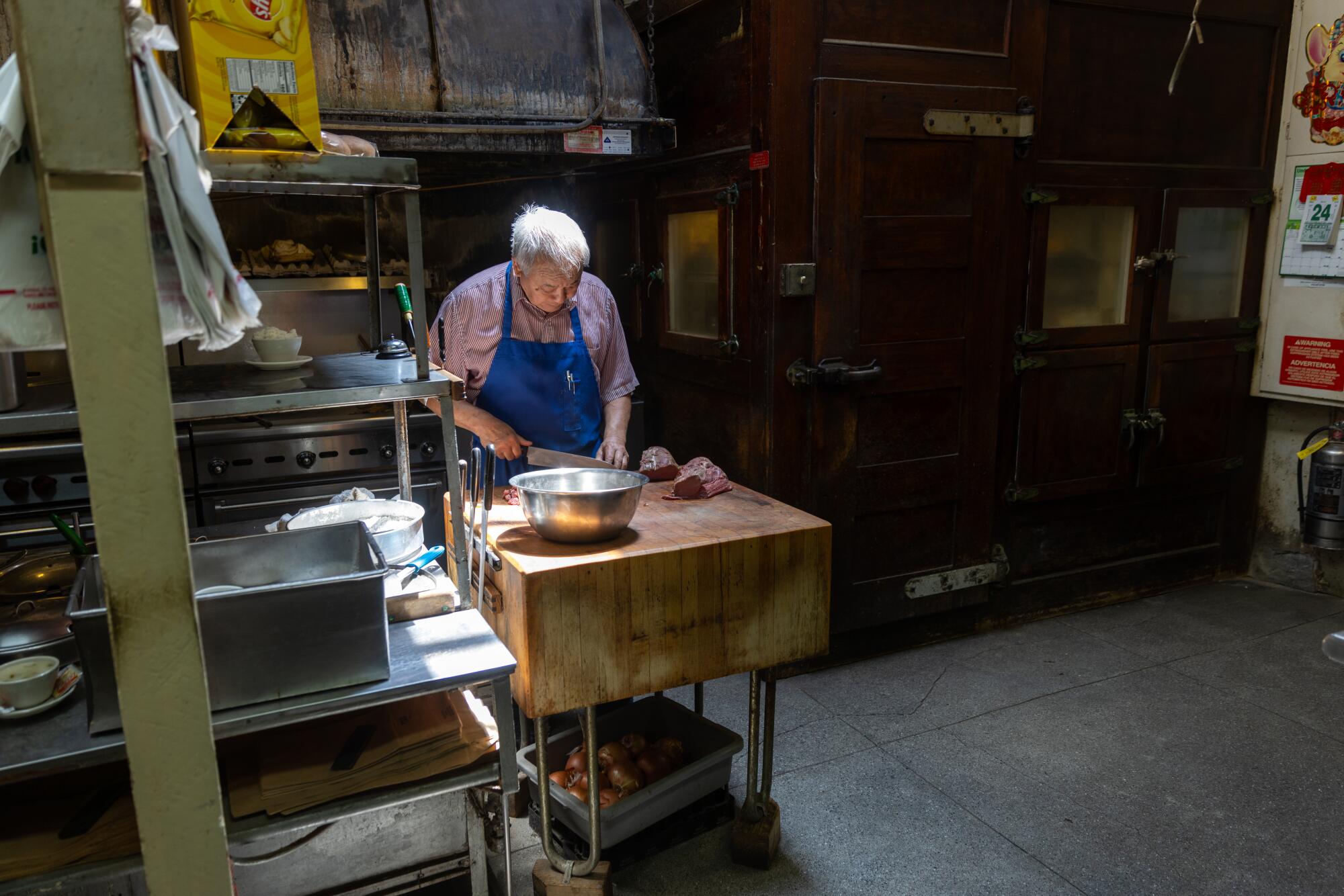
Paul Fong chops food in the solitude of his kitchen at the Chicago Cafe.
(Carl Costas / For The Times)
Paul Fong doesn’t know much about how his family came to have a restaurant, and why on earth they called it the Chicago Cafe. He was born in the Taishan area of Guangdong province long after his grandfather had left, and they never met. When Paul was still young, his own father left Taishan to join his grandfather in Woodland; he, too, came as a paper son, under the name Yee Chong Pang.
In 1973, Paul and his mother joined his father at the restaurant, along with Nancy. They would have come earlier, but because his father and grandfather had come as paper sons, there was bureaucracy to cut through even after passage of the Immigration Act of 1965, which finally opened the doors to immigration from Asia.
Paul came to Woodland from Hong Kong, a mega-city that even in 1973 had a population that topped 4 million. Woodland was home to just 20,000. It was a shock.
“In Hong Kong, so many people,” he recalled. The streets were bustling, the nightlife vibrant. The liveliest thing about nightlife in Woodland were the stars: The lack of city lights meant the stars sparkled more brightly.
But Paul grew to love it. Though he spoke limited English, he made friends. Amy recalled that bags of freshly shot duck and truckloads of zucchini would be dropped off periodically at the restaurant door. When a family friend accidentally ran over a peacock, it also wound up at the restaurant — mounted on the wall, not on a plate.
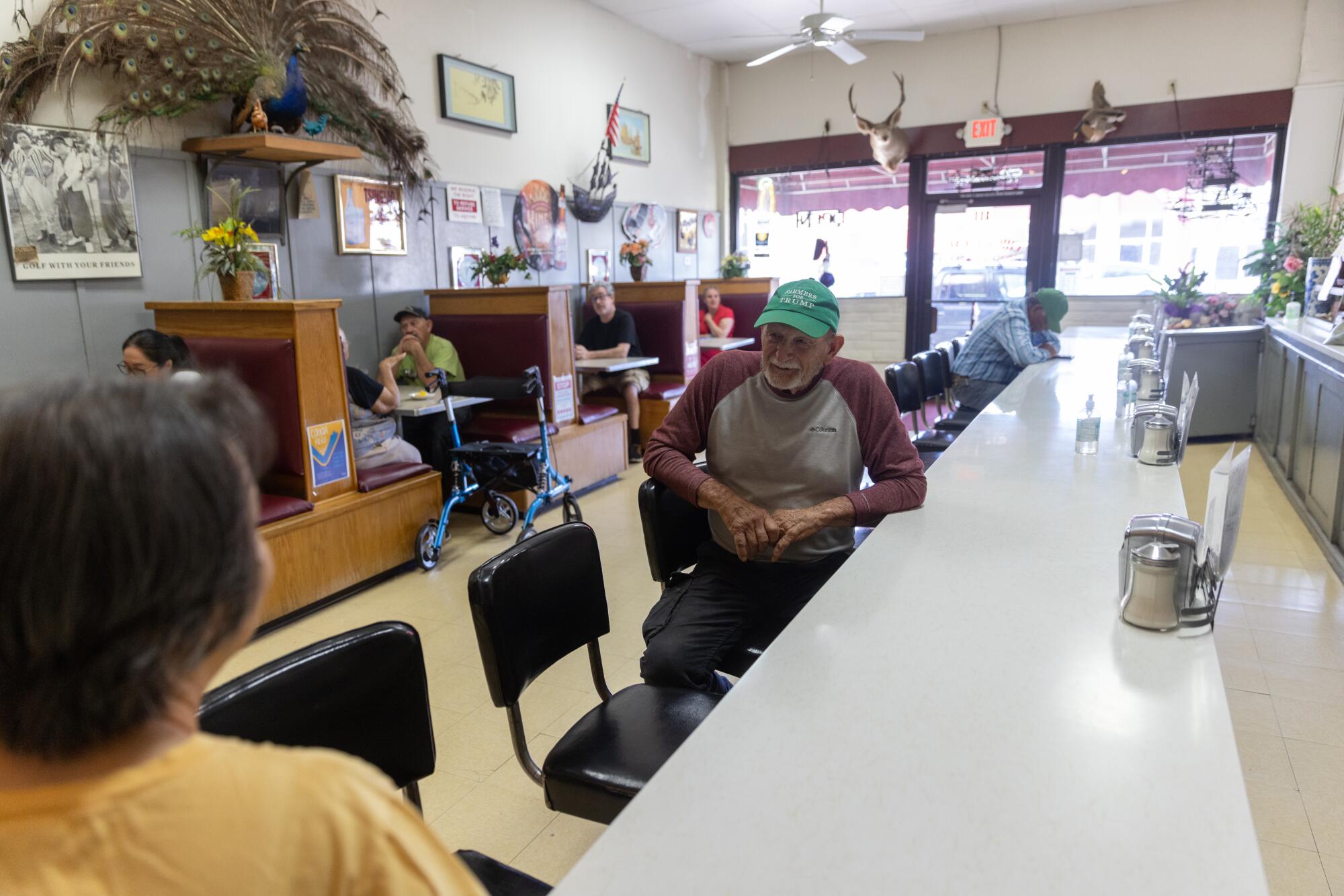
Jerry Shaw has been a regular at the Chicago Cafe for more that four decades.
(Carl Costas / For The Times)
Andy said his parents shared little over the years about how the family wound up in Woodland. He recalled going to visit the Woodland cemetery as a child to pay respects to his grandfather and being startled that the etching on the gravestone said “Young” instead of “Fong.” It was the first he’d heard of paper sons.
The Fong children went to the restaurant every afternoon after school. Looking back on their childhood, they could appreciate it was a local institution. Generations of families from all walks of Woodland life came for lunch and special events. At a recent City Council meeting, almost every council member had a personal story, some dating back decades.
“My family grew up eating at the Chicago Cafe,” said Mayor Tania Garcia-Cadena. Councilwoman Vicky Fernandez recalled that her family did too. “Your doors have always been open to all of us,” she said, adding that because her family was Mexican American, that had not always been true of all the restaurants in town.
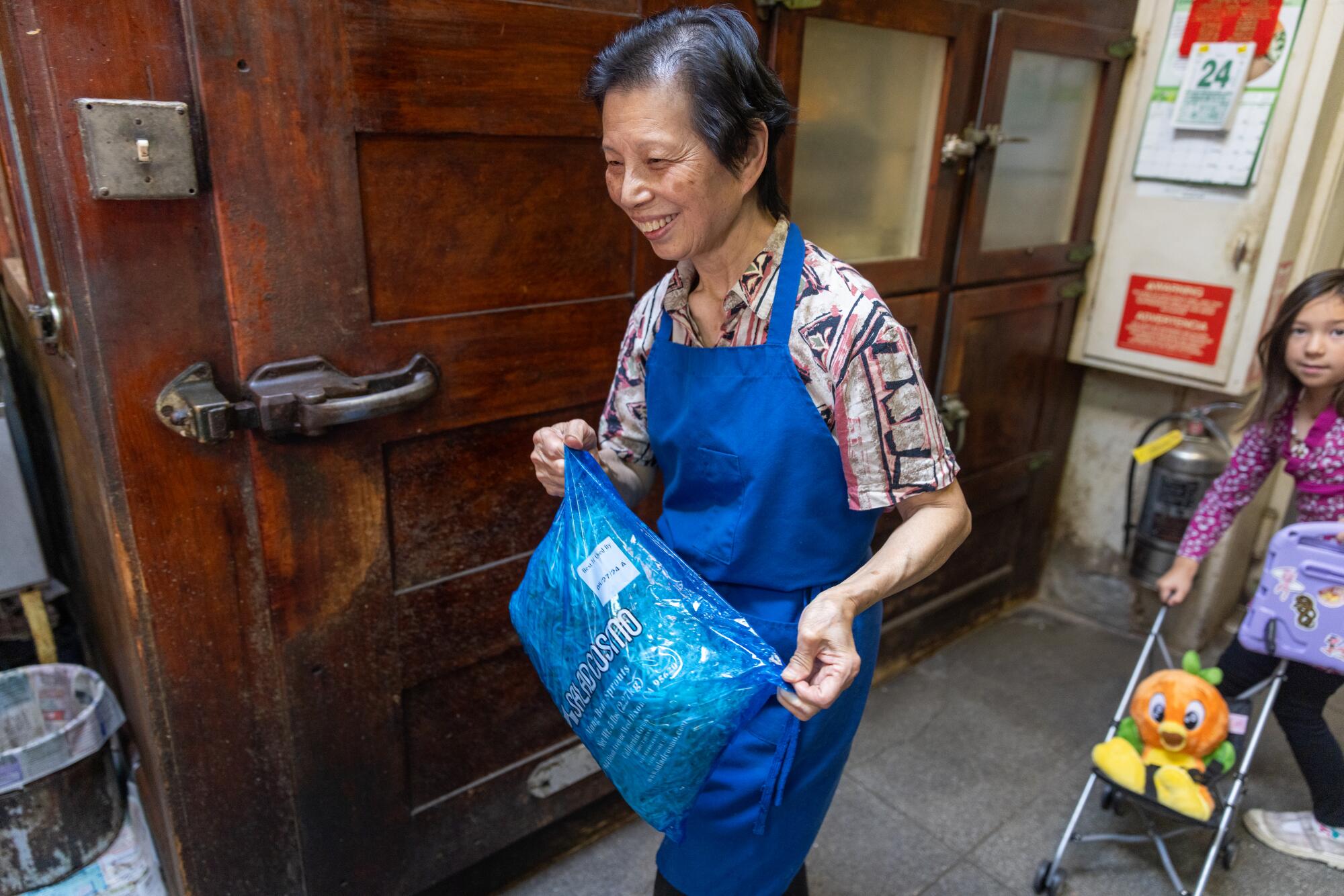
Nancy Fong gathers ingredients during a crowded lunch service at the Chicago Cafe.
(Carl Costas / For The Times)
Still, as proud as they were of their legacy, Paul and Nancy were always clear on one point: Their kids would not be joining the family business. “My dad explicitly told us that he wanted us to go to college. Not do what he was doing, working so hard,” Andy recalled.
When the time came for the couple to retire, the Fong family planned to get out of the restaurant business.
Ten miles down the road, in his office at King Hall on the UC Davis campus, Chin kept thinking about that sign above the counter that said “since 1903.”
Chin grew up in Connecticut and does not speak Chinese. But he was interested in old Chinese restaurants for what they revealed about the history of people of Chinese descent and the legal discrimination they faced for so long.
There are more Chinese restaurants in the United States than there are McDonald’s, and the food they serve is remarkably consistent given much of it would never be served in China.
“A lot of the foods that we think of as Chinese are actually more American and all but unknown in China: General Tso’s chicken, beef with broccoli (broccoli is originally an Italian vegetable), chop suey, egg rolls, fortune cookies. Especially fortune cookies,” journalist Jennifer 8. Lee explained in a 2008 essay about her book, “The Fortune Cookie Chronicles.”
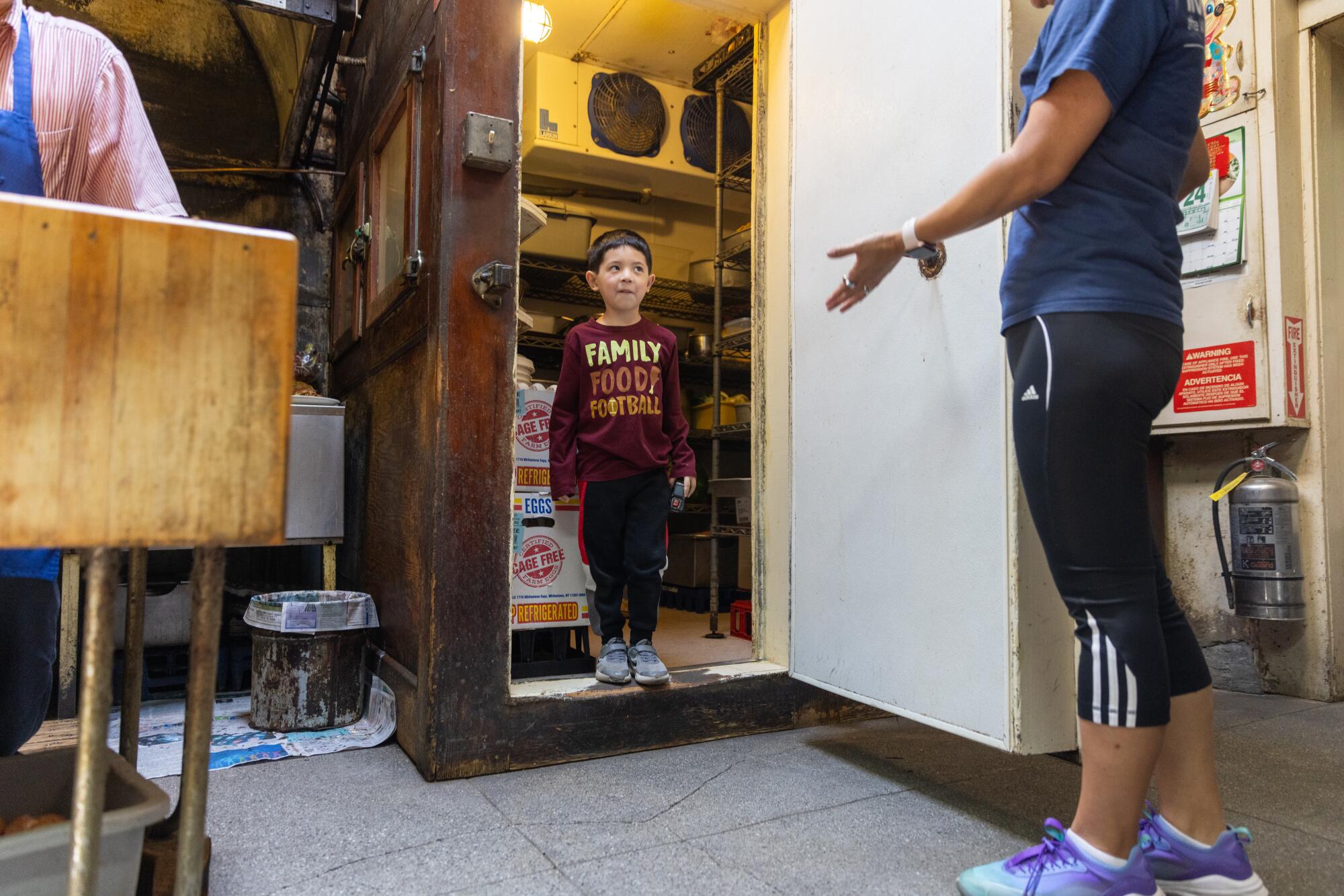
Torin Kranz bides his time in an aged walk-in cooler while his grandparents work the kitchen at the Chicago Cafe.
(Carl Costas / For The Times)
This is especially true at the Chicago Cafe, which serves sausage and eggs, pork chops and apple sauce and, on Fridays, clam chowder, along with traditional Chinese American fare such as chop suey and chow mein.
But if these old restaurants don’t reveal much about Chinese food, Chin said, they do reveal a lot about America.
As a law professor, Chin was interested in how elected officials and labor leaders had crafted laws to advance a larger anti-immigration agenda.
In 2018, he and a colleague published a paper called “The War Against Chinese Restaurants,” which laid out the innovative legal efforts — including zoning, licensing and trying to regulate women’s activities — employed in the early 20th century to drive Chinese restaurants out of business.
Researching that paper made him keenly aware of how many Chinese restaurants had operated in America — and how fleeting many of them were. He knew most authorities believed the oldest continuously operating Chinese restaurant was the Pekin Noodle Parlor in Butte, Mont., which dated to 1909 or 1911.
If the Chicago Cafe started in 1903, that made it older.
Chin asked the Fong family whether he could bring in archivists to try to get to the bottom of the mystery? Sure, the family said.
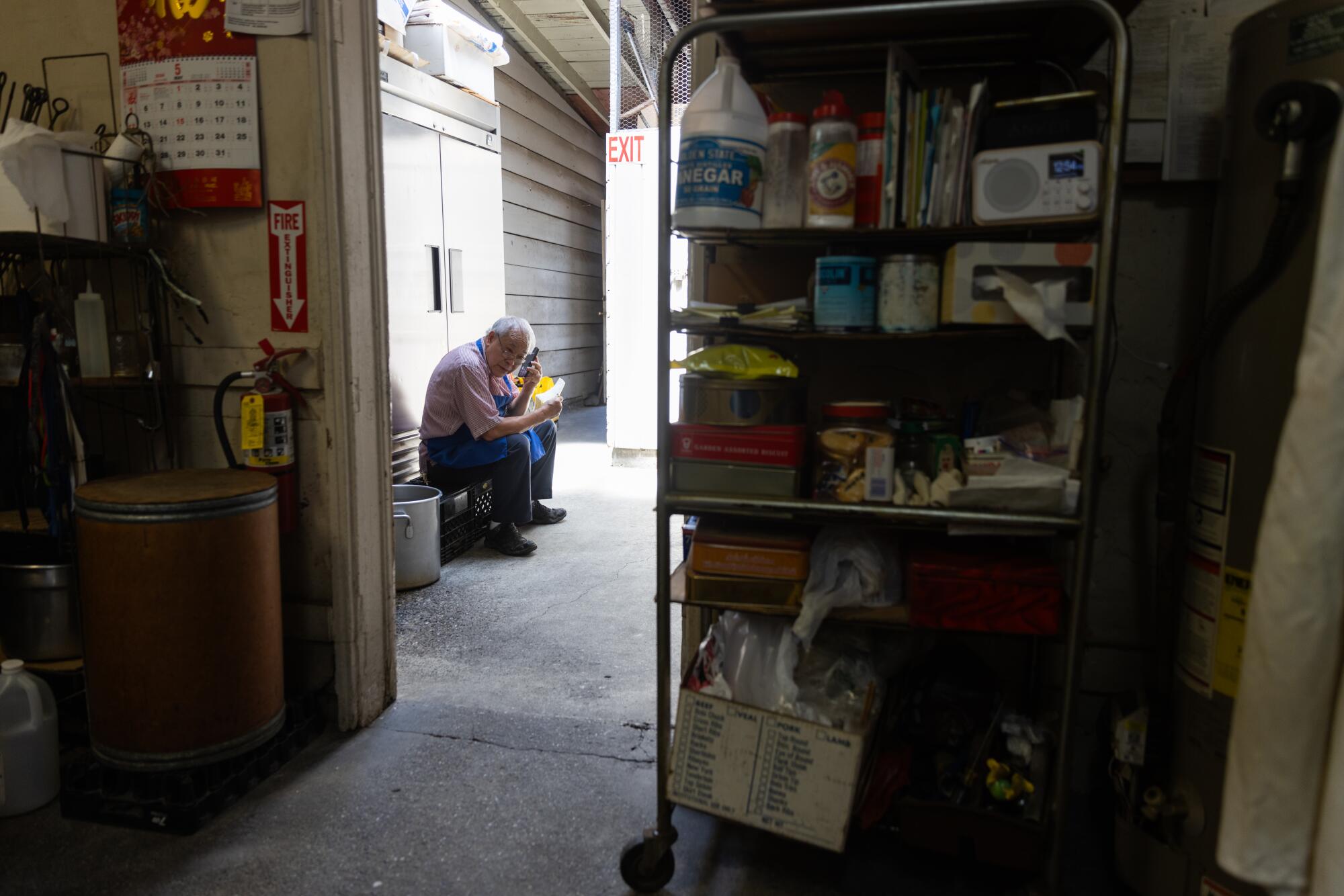
Paul Fong handles business calls during a busy lunch service at the Chicago Cafe.
(Carl Costas / For The Times)
A group descended on the restaurant, digging into dusty cabinets, the attic and the old storage room that included a bed where laborers used to grab naps. They pored over menus, tax receipts and letters. They dove into the archives of the Woodland Daily Democrat and old yearbooks from Woodland High School.
By last spring, Chin and his co-researchers had produced another scholarly paper. “We believe that this is the oldest continually operating Chinese restaurant in the United States,” Chin said of his finding.
The modest storefront on Main Street — with its cash-only policy — suddenly had a new cache. Tourists came from Sacramento and San Francisco. Locals came flooding back.
“You can’t even get in now,” said Michelle Paschke, a longtime friend whose family used to run a neighboring store. Paschke sat at the packed lunch counter on a recent afternoon, waiting to pay. All around her, other patrons were in the same situation, holding cash out like supplicants while Olstad gestured that she would be there as quickly as she could.
“It’s been a blessing,” Andy said of the overwhelming interest. “At the same time,” he said, “I do want my parents to relax. And somewhat selfishly, I want them to spend time with their grandchildren.”
Back in the kitchen, Paul and Nancy turned out plates with a lightning rhythm, honed over years of practice. “It’s good I guess. It makes me pretty busy,” Paul said of the lunch crowd.
Still, he added, he couldn’t do this forever. “I’m old, he said, smiling.
But on this day, he was still working, and the orders were piling up. Nancy gestured to a plate of pork ready to be fried. Paul stepped back to the grill.
